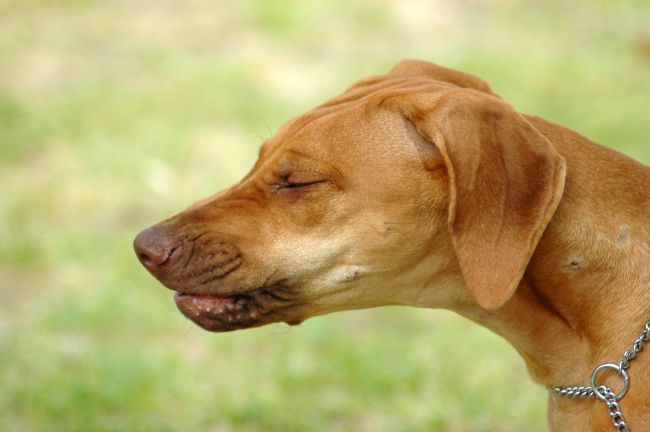
When a pet behaves oddly or does something out of the ordinary, it piques the interest of their pet owner. The occasional sneeze is nothing to raise concerns, but when dog repeatedly sneezes, wheezes or indicates signs of respiratory trouble, it is time to pay attention. Below are some reasons why your dog might be sneezing, and how to tell if it is a serious health issue or simply a bout of sniffles.
Reasons Why Dogs Sneeze
Allergy season: It sounds obvious, but many pet parents forget to consider the possibility that their pooch is affected by seasonal changes and plants. If the sneezing seems to happen during the spring or summer, it might be because certain pollen from flowers, grasses and trees are giving your pup a runny nose. Allergic symptoms also occur when household chores like vacuuming, dusting, and pillow-fluffing send dust bunnies and allergens back into the air. A freshly-mowed lawn might even make a hay fever-sensitive hound tumble into round of “achoo-ing!” The canine is likely fighting allergies if he is also rubbing his face with his paws, biting his skin (indicating itchiness/rashes/hives under the fur), or if there is evident discharge of the nose and eyes.
Exploration: Whenever a dog goes, his nose has already been there first. Canines are enthusiastic explorers and diggers, who constantly poke their snouts down dirty holes and dark corners. In such circumstances, they end up breathing in all kinds of particles, from lint, to wood chips, grasses, and pieces of cloth. Sometimes, objects can get stuck in their nasal cavity, causing irritation or itchiness, which makes them sneeze. If the sneezing persists, and the dog behaves in an increasing agitated way, or seems to have trouble breathing, he may need veterinary care to remove whatever is obstructing his respiratory passage.
Infection: Since the mouth, sinus and nasal cavities are all closely connected, viral or bacterial infections can easily spread through these primary areas. Kennel cough is a common ailment spread among canines, and is a likely cause if the pup also seems to cough, or have a runny nose, or snores when he sleeps (if he does not usually do so.)
*NOTE: Dogs sneeze in different ways. For example, some pet owners might remark that their dog sneezes whenever playtime gets especially rowdy or full of anticipation, or whenever the owner walks through the door. This is a more subtle, brief sneeze that is primarily brought on by excitement. Such sneezing should not raise alarm, while illness/allergy related sneezing will be louder, more distinct and consistent.
Call Your Vet IF:
- There is blood in the nasal drainage.
- The dog struggles to breathe normally or is wheezing consistently.
- The dog has a fever. (This can mean the dog is fighting off an illness, or respiratory infection or bacteria which if untreated could escalate rapidly.)
- The dog’s face is swelling. (This could be caused by insect bites, stings or infections that should be looked at immediately.)
- The dog has been sneezing for 3-4 consecutive days.
- The dog seems weak or exhausted, or like he is losing steam.
*When in doubt, go to the vet!

